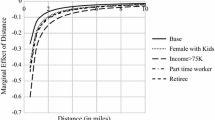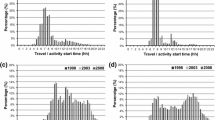Abstract
This paper poses a challenge and begins a search. The challenge is to reconsider the usefulness of traditional activity types (“work”, “shopping”, etc.) in the understanding and modelling of travel behaviour. The search is for the more salient attributes of activities that may serve to better explain complex travel behaviours—such as activity scheduling and tour formation. In particular, this paper focuses on explicit measures of the spatial, temporal and interpersonal flexibility of activities, along with several traditional attributes (frequency, duration, involved persons, travel time, and location). Data from a recent in-depth week-long activity scheduling survey was used to define and compare these attributes. Results show that considerable variability in the attributes between and within traditional activity groups is evident. This casts considerable uncertainty on assumptions that statically assign levels of spatial, temporal, and interpersonal flexibility to any given activity type. A Principal Components Analysis further revealed eight new distinct clusters of activities that share like attributes. The relative role of each attribute in each component is examined, and subjective interpretations emerged (e.g., “Long and frequent”, “Space and time flexible” “Social networking”). The implications of these results for future model development and research are discussed. Future research should continue to expand the search for salient attributes and link them more directly to decision processes.
Similar content being viewed by others
References
Arentze, T.A., Timmermans, H.J.P.: ALBATROSS: A Learning Based Transportation Oriented Simulation System. The European Institute of Retailing and Services Studies. Eindhoven, The Netherlands (2000)
Bowman, J.L., Ben-Akiva, M.E.: Activity-based disaggregate travel demand model system with activity schedules. Trans. Res. A 35(1), 1–28 (2001)
Brandth, B. and Kvande, E.: Flexible work and flexible fathers. Work Employ. Soc. 15(2), 251–267 (2001)
Breedveld, K.: The double myth of flexibilization: trends in scattered work hours, and difference in time-sovereignty. Time Soc. 7(1), 129–143 (1998)
Cullen, I. and Godson, V.: Urban networks: the structure of activity patterns. Prog. Plann. 4(1), 1–96 (1975)
Doherty, S.T.: Rules for assessing activity scheduling survey respondents’ data quality. J. Trans. Res. Board 1870, 109–115 (2004)
Doherty S.T.: How far in advance are activities planned? Measurement challenges and analysis. Journal of the Transportation Research Board 1926, 41–49 (2005)
Doherty, S.T., Miller, E.J.: A computerized household activity scheduling survey. Transportation 27(1), 75–97 (2000)
Doherty, S.T., Mohammadian, A.: Application of Artificial Neural Network Models to Activity Scheduling Time Horizon. J. Trans. Res. Board 1854, 43–49 (2003)
Doherty, S.T., Nemeth, E., Roorda, M., Miller, E.J.: Design and assessment of the toronto area computerized household activity scheduling survey. J. Trans. Res. Board 1894, 140–149 (2004)
Emmerink, R., van Beek, P.: Empirical analysis of work schedule flexibility: Implications for road pricing and driver information systems. Urban Stud. 34(2), 217–234 (1997)
Hägerstrand, T.: What about people in regional science?. Pap. Reg. Sci. Assoc. 24(7), 7–21 (1970)
Joh C.H., Doherty S.T., Polak J.W.: Analysis of factors affecting frequency and type of activity schedule modification. J. Trans. Res. Board 1926, 19–25 (2005)
Kitamura, R., Chen, C., Pendyala, R.M., Narayanan, R.: Micro-simulation of daily activity-travel patterns for travel demand forecasting. Transportation 27(1), 25–51 (2000)
Limanond, T., Niemeier, D.A., Mokhtarian, P.L.: Specification of a tour-based neighborhood shopping model. Transportation 32, 105–134 (2005)
Miller, E.J.: Propositions for modelling household decision-making. In: Lee-Gosselin M., Doherty S.T. (eds) Integrated Land Use, Transportation Models: Behavioural Foundations, pp. 21–60. Elsevier, Oxford (2005)
Miller, E.J. and Roorda, M.J.: A Prototype Model of Household Activity/Travel Scheduling. Trans. Res. Rec.: J. Trans. Res. Board 1831: 114–121 (2003)
Mohammadian A., Doherty S.T.: A mixed logit model of activity scheduling time horizon incorporating spatial-temporal variables. J. Trans. Res. Board 1926, 33–40 (2005)
Roorda M., Miller E.J.: Strategies for resolving activity scheduling conflicts: an empirical analysis. In: Timmermans, H. (ed.) Progress in Activity-Based Analysis, pp. 203–222. Elsevier Science, Oxford (2003)
Schwanen, T., Dijst, M.: Time windows in workers’ activity patterns: empirical evidence from the Netherlands. Transportation 30(3), 261–283 (2003)
Shiftan, Y.: Practical approach to model trip chaining. Trans. Res. Rec. 1645, 17–23 (1998)
Steward, B.: Changing times: the meaning, measurement and use of time in teleworking. Time Soc. 9(1), 57–74 (2000)
Acknowledgements
The author would like to thank all those who contributed to the collection of the data for this paper, including especially Matt Roorda, Erika Nemeth, Eric Miller, Martin Lee-Gosselin, Kim Tran, May Lynn Fong, and all those who graciously contributed their time to completing the survey. The author would also like to acknowledge the financial support received from the Social Sciences and Humanities Research Council of Canada.
Author information
Authors and Affiliations
Corresponding author
Rights and permissions
About this article
Cite this article
Doherty, S.T. Should we abandon activity type analysis? Redefining activities by their salient attributes. Transportation 33, 517–536 (2006). https://doi.org/10.1007/s11116-006-0001-9
Accepted:
Published:
Issue Date:
DOI: https://doi.org/10.1007/s11116-006-0001-9




